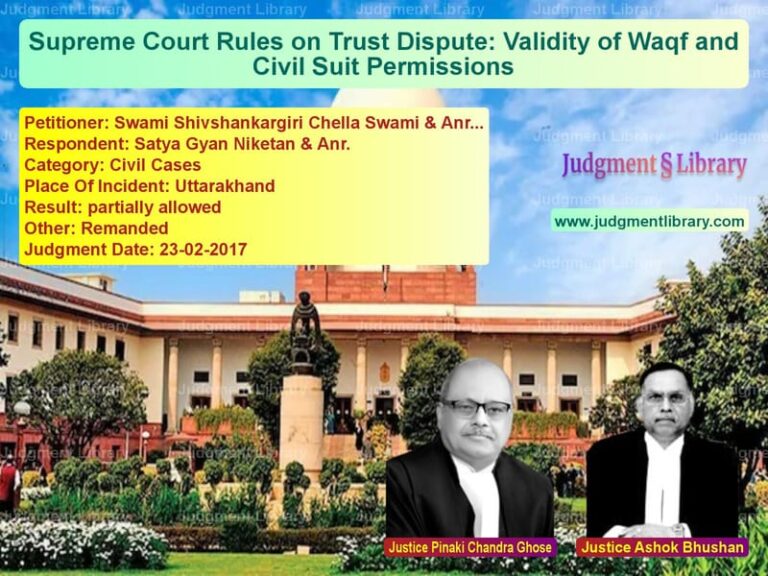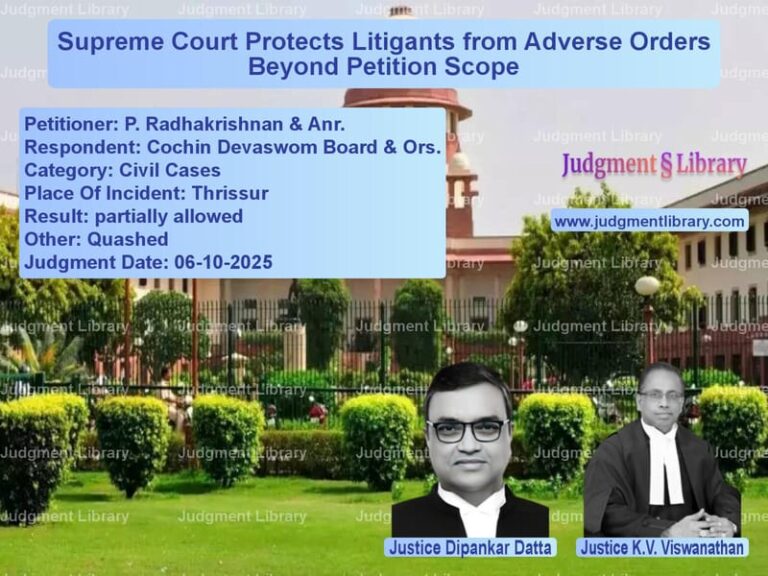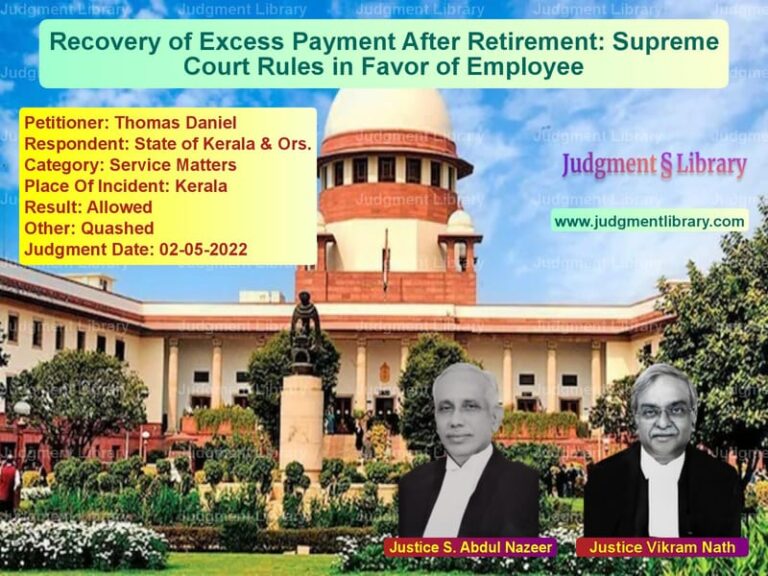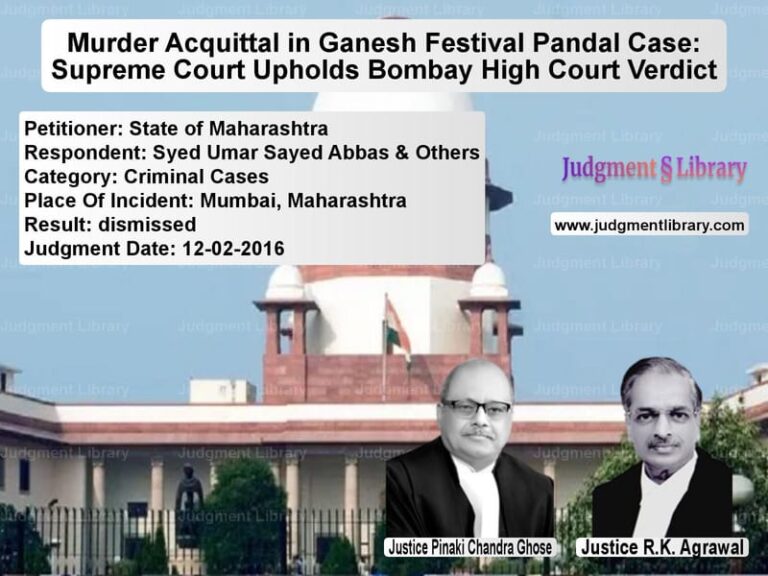Supreme Court Rules on Pension Eligibility in Contract Employment Regularization
The Supreme Court of India, in the case of National Institute of Rural Development vs. Shyam Sunder Prasad Sharma & Others, addressed a crucial issue regarding pension eligibility for employees whose services were regularized after initially being appointed on a contractual basis. The Court ruled that an employee who initially opted for the Contributory Provident Fund (CPF) cannot later switch to the General Provident Fund (GPF) and pension scheme upon regularization if the applicable rules do not permit such a switch.
Background of the Case
The National Institute of Rural Development (NIRD) appointed respondent no. 1, Shyam Sunder Prasad Sharma, as an Associate Professor on August 14, 2002, on a contractual basis. Though the post was a regular position, he was appointed on a three-year contract, extendable up to five years. At the time of appointment, he opted for the CPF scheme.
Later, on May 1, 2007, he was appointed as a Professor on a contractual basis with a similar option for the CPF scheme. In 2012, NIRD implemented the Regularization Rules for faculty members who were originally appointed on a contract basis. Sharma’s appointment as a Professor was regularized through an order dated May 4, 2012, which explicitly stated that he would be entitled to benefits under the new pension scheme.
Subsequently, Sharma filed a representation seeking benefits under the old pension scheme, arguing that since he was initially appointed in 2002, he should be eligible for the pension scheme applicable at that time. His representation was rejected, leading him to approach the Central Administrative Tribunal (CAT). The CAT ruled in his favor, directing NIRD to grant him pension benefits under the old scheme. The Telangana High Court upheld the Tribunal’s decision, prompting NIRD to appeal before the Supreme Court.
Arguments by the Appellant (National Institute of Rural Development)
- Sharma’s initial and subsequent appointments were on a contractual basis, and he had voluntarily opted for the CPF scheme.
- His employment was regularized only in 2012, and as per the Regularization Rules, he was entitled only to the new pension scheme applicable to employees appointed after January 1, 2004.
- The Regularization Rules did not permit employees to switch from the CPF scheme to the old pension scheme upon regularization.
- Since he accepted the regularization order, which clearly mentioned the new pension scheme, he could not later claim benefits under the old scheme.
- If Sharma were granted the old pension scheme, it would create an undue financial burden of over Rs. 8 crores on the institution, affecting similarly situated employees.
Arguments by the Respondent (Shyam Sunder Prasad Sharma)
- He was initially appointed against a regular post and should have been entitled to pension benefits available at the time of his first appointment in 2002.
- The Regularization Rules had an exception for those initially appointed on a regular post and later given a contract-based appointment in a higher academic position.
- Other employees under similar circumstances were granted benefits under the old pension scheme.
- He had challenged the condition in the regularization order that assigned him to the new pension scheme, showing that he did not accept it voluntarily.
Supreme Court’s Analysis and Judgment
The Supreme Court examined the Regularization Rules, the terms of Sharma’s appointment, and the applicable pension schemes. The key findings were:
- Contractual Appointment Does Not Confer Pension Rights: The Court ruled that since Sharma was initially appointed on a contractual basis, he did not have an automatic right to pension benefits applicable to regular employees.
- Regularization Does Not Change the Original Pension Option: Sharma had voluntarily chosen the CPF scheme at the time of his initial appointment. The Regularization Rules allowed employees to continue their existing scheme but did not permit a switch from CPF to the old pension scheme.
- No Retrospective Application of Regularization: The Court held that Sharma’s regularization was effective from May 4, 2012, and could not be backdated to his initial contractual appointment in 2002.
- Clarification of Rule 6 of the Regularization Rules: The Court interpreted Rule 6 of the Regularization Rules to mean that employees already under CPF or GPF schemes could continue with their respective choices but could not switch schemes upon regularization.
- Incorrect Interpretation by CAT and High Court: The Court ruled that the CAT and High Court had wrongly interpreted the Regularization Rules by allowing Sharma to change his pension option.
The Court stated:
“The exception carved out in Rule 6 provides that the main part of Rule 6 will not affect an employee initially appointed on a regular post who was presently holding a high academic post on a contract basis and who was subscribing to either CPF or GPF-cum-pension scheme of the appellant from the date of his initial regular appointment. This exception is applicable to a member of the academic staff who was regularly employed earlier but was holding a high academic post on a contract basis when the Regularization Rules came into force. The exception will not apply to an employee like respondent no.1, whose first appointment was also on a contract basis and the appointment to a higher academic post was also on a contract basis.”
Final Verdict
- The Supreme Court set aside the orders of the CAT and Telangana High Court.
- It ruled that Sharma was not entitled to pension benefits under the old pension scheme and must remain under the CPF scheme.
- The Court directed NIRD to return the CPF contributions that Sharma had earlier refunded in anticipation of switching to the old pension scheme.
- The amount was to be paid within two months, failing which it would attract an interest of 8% per annum.
This judgment sets a precedent for pension eligibility in cases of contract employment regularization. It clarifies that employees who voluntarily opt for CPF cannot later claim benefits under the old pension scheme unless explicitly permitted by the applicable rules.
Petitioner Name: National Institute of Rural Development.Respondent Name: Shyam Sunder Prasad Sharma & Others.Judgment By: Justice Sanjay Kishan Kaul, Justice Abhay S. Oka.Place Of Incident: Telangana.Judgment Date: 27-02-2023.
Don’t miss out on the full details! Download the complete judgment in PDF format below and gain valuable insights instantly!
Download Judgment: national-institute-o-vs-shyam-sunder-prasad-supreme-court-of-india-judgment-dated-27-02-2023.pdf
Directly Download Judgment: Directly download this Judgment
See all petitions in Pension and Gratuity
See all petitions in Judgment by Sanjay Kishan Kaul
See all petitions in Judgment by Abhay S. Oka
See all petitions in allowed
See all petitions in Quashed
See all petitions in supreme court of India judgments February 2023
See all petitions in 2023 judgments
See all posts in Service Matters Category
See all allowed petitions in Service Matters Category
See all Dismissed petitions in Service Matters Category
See all partially allowed petitions in Service Matters Category







